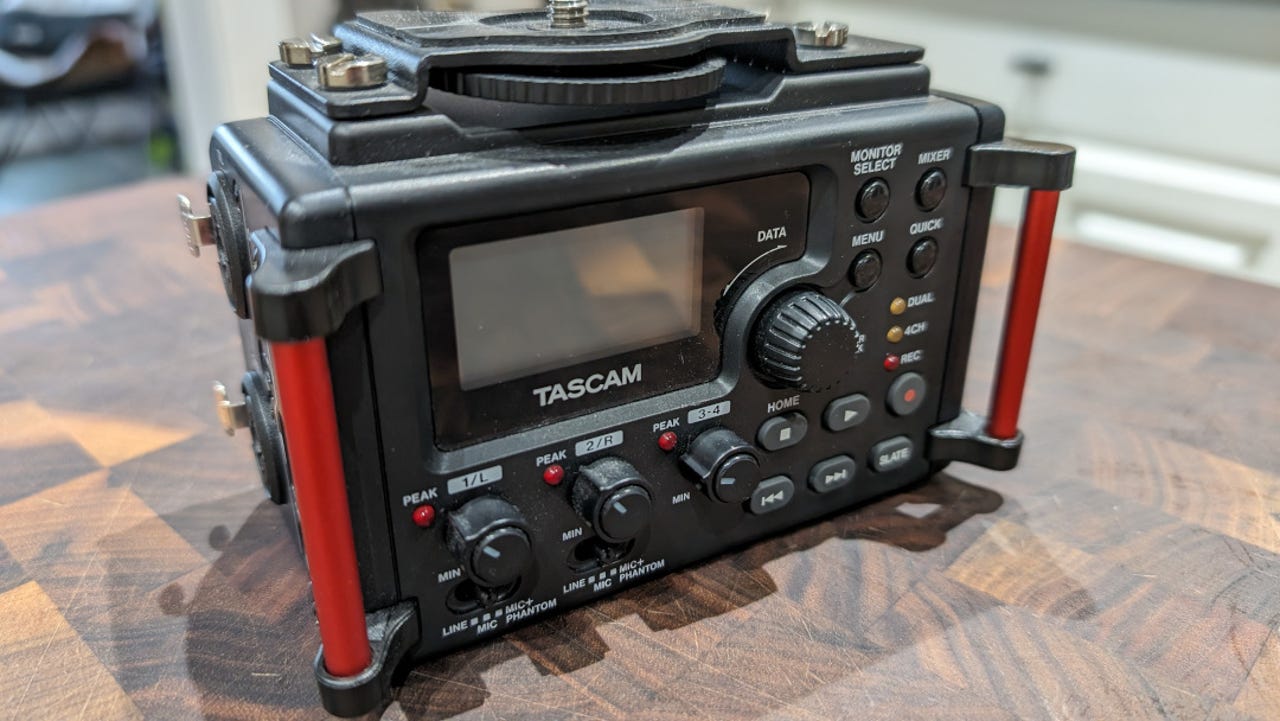
This audio recorder will be an outstanding addition to your video, podcast, or interview arsenal. Jack Wallen/ZDNET
ZDNET’s key takeaways
- The Tascam DR-60DmkII DSLR Audio Recorder has been available for a while and can be purchased on Amazon for $169.
- Brilliant sound, user-friendly, and plenty of inputs make this a must-have for anyone who wants to simplify and improve the audio of their videos, podcasts, and interviews.
- Less than stellar battery life means you’ll want to power this recorder using USB.
About a year and a half ago, I embarked on a project that would prove to be one of the most challenging creative endeavors I’d ever attempted…film a sitcom pilot. Since then, the project has evolved into something completely different (and far more viable). But at the time, I quickly discovered one area that required a good deal of attention: sound.
What I needed was a way to record audio to an external source. There isn’t a camera on the market that can record audio of the caliber required for such things. Yes, I could use the camera audio to sync the external audio, but once synced, the camera audio would be muted or removed altogether.
Also: The best streaming mics for TikTok, YouTube, and Twitch
When I started looking into devices for this, I quickly discovered there was one device that would serve my purpose well and not decimate my budget. That device is the Tascam DR-60DmkII DSLR Audio Recorder.
While DSLR is in the name, I didn’t connect it to my camera and, instead, used it to record from two wireless Sony microphones. The quality of sound this device recorded far exceeded my expectations, which meant it quickly found a spot within my primary toolkit.
The specs
- Four microphone inputs with 64dB smooth gain and +48V phantom power (for XLR inputs)
- Channels 3 & 4 support High-Output mics
- Four track recording (two XLR and a single 3.5 mm for tracks 3 and 4)
- A/D converters
- Supports up to 96Hz/24-bit WAV or BWAVE audio to SD/SDHC card
- Low filter cut and limiter
- Camera In, Camera Out, Line Out, and Headphone Out
- Line/Mic/Phantom switches for inputs 1 and 2
- Safety Track mode (to prevent clipping)
- High equivalent input noise (EIN) of -120 dBu
- Mono, Stereo, Dual Mono, Dual Stereo, and four track recording modes
- WAV recording format
- Tripod mounting socket (bottom) and mounting screw attachment (top)
- Powered by USB or four AA batteries
- Weighs 1.12 pounds
My experience
I’ve used the Tascam multiple times. The first was the most challenging but also proved to be the most rewarding. Recording sound for video can be a very difficult task, especially because so many things can go wrong. You could get the best take ever, only to find that the audio failed. After such experiences, you really want to make sure your equipment is up to the task.
Also: This handy accessory drastically improved my phone’s video quality
I found that the Tascam performs beautifully and helps to eliminate the possibility of bad audio. Granted, I was using outstanding microphones for the filming (which is a must), so I could trust the sound source would be solid. But what I really appreciated about the Tascam (besides the high-quality sound) was the simplicity of use.
Turn it on, check levels, press the REC button twice, and you’re off. Once the take is finished, hit Stop, and the recording is saved to the SD card.
It really is that simple. When everything you’re doing is already overly complicated, having just one thing simplified can make a big difference.
Once the sitcom pilot had to be shelved (and was eventually resurrected into another project… hurray!), I found another use for the Tascam… podcasts and interviews.
As long as all the parties for a given interview or podcast are in the same room, this little device can quickly become your best friend. Because it’s so simple and reliable (and because it records excellent audio), you can trust that every second of your recording will be usable (so long as your subjects do their job). This baby won’t fail you.
Also: This simple microphone accessory will instantly make you sound more professional
I would, however, suggest that you always power the Tascam via USB. Its battery life is not exactly the greatest and when scenes, podcasts, or interviews go long, you don’t want to have to worry your batteries will fail you at the most inopportune moment.
Other than that one caveat, this little recorder has become one of my favorite audio purchases in a while.
ZDNET’s buying advice
As long as you have quality mics (and a well-chosen location for recording), the Tascam DR-60DmkII DSLR Audio Recorder will serve you very well. After using it once, you’ll be sold and will forget about recording audio on your phone or your laptop. The simplicity you get, combined with the quality of recording, makes this a no-brainer for numerous uses.




















+ There are no comments
Add yours